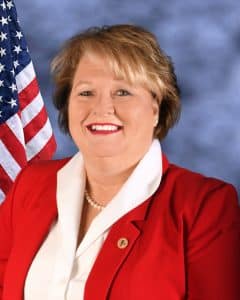Bryant moves to Senate

Republican Terri Bryant officially moved over to the Illinois Senate last Wednesday, taking over the seat representing the 58th Senate district that Paul Schimpf of Waterloo vacated.
Bryant, who has represented the 115th House district south of Monroe County for the last six years, said she decided to run for this office for many of the same reasons she did her previous one.
“My personality is assertive. I have a high energy level. I understand the different dynamics not just within the district, but the region itself,” said Bryant, who grew up in St. Clair County and now lives in Jackson County. “I was so successful in attacking the issues for the 115th that running for the 58th was the next, natural progression.”
Bryant has worked in public service since 1994 when she got an entry-level job in the Illinois Department of Corrections.
She worked her way up the ranks, retiring after 20 years as public service administrator at Pinckneyville Correctional Center and the DuQuoin Impact Incarceration Program.
Bryant, who also has business experience via farming with her husband and owning a restaurant, first got involved in Illinois politics behind the scenes in 2006 when she started serving as a GOP precinct committeewoman in Jackson County.
Her interest in politics, however, stretched back much further.
“I was always interested in it,” she said. “I ran for president of everything in school because I wanted to be in control of everything that was going on.”
She continued working jobs like vice president of the Jackson County Republican Women’s Club until Jackson County attempted to pass a public safety tax to expand its jail.
Bryant, who was still working in the IDOC, said she knew the county board wanted to get more money through the tax and only needed to expand the jail because it was housing federal inmates, which it also received money for.
“I believe then and I believe now that it was a boondoggle,” Bryant said. “I understood that and it infuriated me.”
So, she ran for office in a heavily Democratic race in an effort to change that, losing twice but closing the gap on the second effort.
That got the attention of political leaders in the region, and Bryant went to the Illinois Lincoln Excellence in Public Service Series.
Based on her experience there, Mike Bost informed Bryant shortly before he announced he would not be seeking re-election in order to run for Congress.
Bryant won that seat in the Illinois House in November 2014.
“I think I had a very productive tenure there,” she said of her service in that body.
Bryant highlighted her work opposing the “anti-labor” initiatives of then Gov. Bruce Rauner and efforts to pass Molly’s Law while in the House.
Molly’s Law, which advisors warned would be impossible to pass, makes changes to the Illinois Wrongful Death Act, including allowing a person to sue within five years after the date of death in the case of violent intentional conduct.
Bryant also said she was proud of her voting record to protect Southern Illinois University, which suffered immensely due to the state’s budget woes.
“It made some people angry that I voted for a tax increase during the budget impasse, but I think we’re seeing how important it was now to make sure those bills were paid,” she said. “I was glad to be a part of getting the state back to a position where we were not hours away from being in junk bond status.”
In her new role as state senator, Bryant said her experience in the house is already making a difference because she does not “have to start at square one,” making her feel “almost like an incumbent.”
“Although I am assertive and known as a fighter, I have not been combative in a way that has created a lot of enemies,” she said. “I’m well-known, and I’m known to work with both sides of the aisle when we have common ground. I always look for commonality.”
Bryant plans to do that with her two highest legislative priorities this year.
She has already filed both bills, one of which would change how Illinois awards its electoral votes in presidential races. Instead of whichever candidate who wins the popular vote getting all of the state’s electoral votes, Bryant’s bill would divide electoral votes by congressional district, with each district’s popular vote determining where its vote goes. The state’s two at-large votes would still be determined by overall popular vote.
“Southern Illinois always feels, in presidential races, as with a lot of other issues, that we’re left by the wayside,” Bryant said. “Illinois is an all-or-nothing state when it comes to electoral votes, and I think that makes people very angry.”
The other legislation Bryant plans to champion would potentially expand grandparents’ rights.
Currently, if a parent dies or parents get divorced and one of the parents does not want the children to see their grandparents, the grandparents have no visitation right.
The legality of that has been upheld by courts, but Kentucky has a law that allows courts to at least consider grandparents’ rights when making custody decisions, which is not possible now in Illinois.
“We are going to mirror that law in Kentucky. I’m going to run a grandparents’ rights bill that would at least give judges the opportunity to look at whether the grandparents should get some rights,” Bryant said.
As she works on those and other bills, Bryant said she will be available to speak with constituents.
She will maintain a Waterloo office at the same location in front of Rural King where Schimpf had a campaign office, and she can be reached by phone at 618-684-1100.
Bryant, who noted she has some history in Columbia, also said she will come to the northern part of her district rather than have people drive to Murphysboro to meet with her.
“I want the 116th side to know that I’m attentive and ready to go to work for them,” Bryant pledged. “I operate a little bit differently, and I’m very hands-on. I’m at their disposal.”






